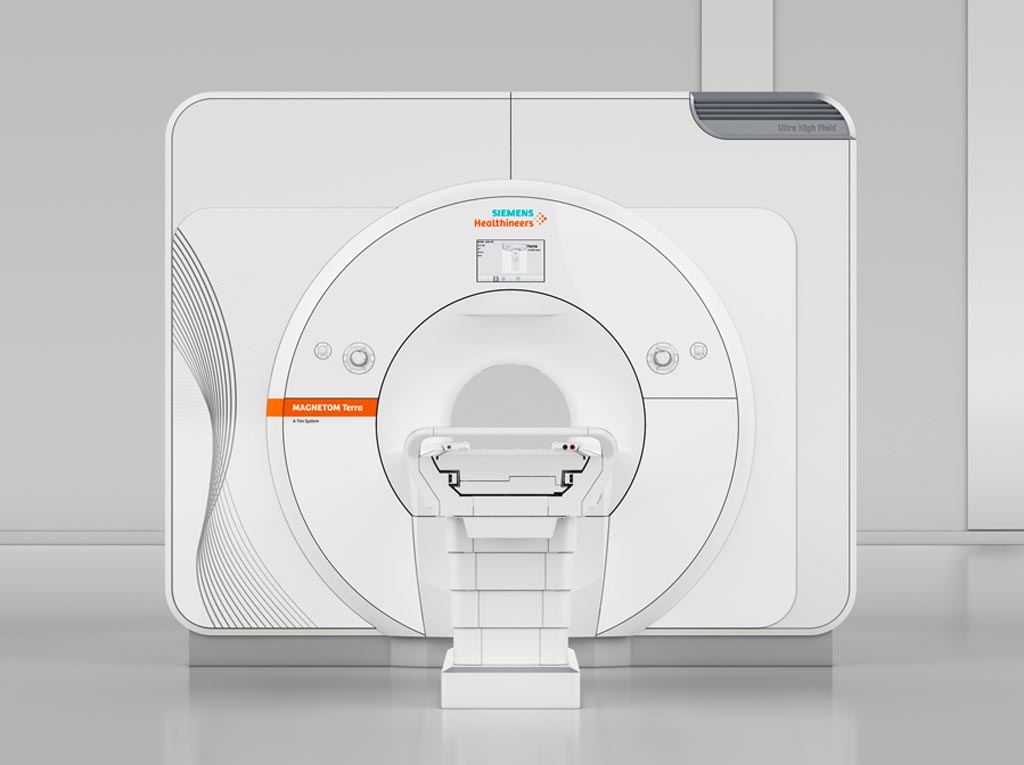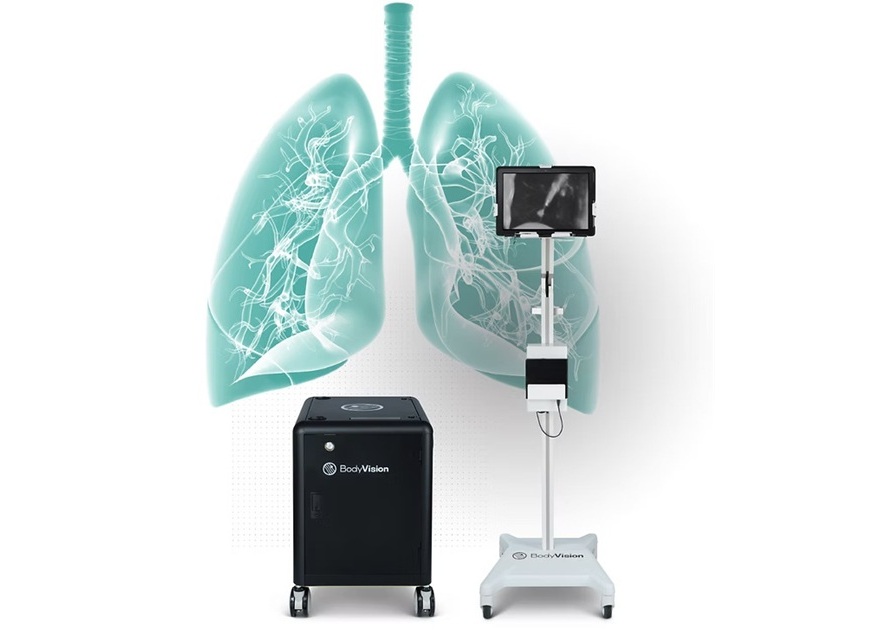7T MRI Scanner Doubles Static Magnetic Field Strength
|
By MedImaging International staff writers Posted on 13 Nov 2017 |

Image: The new Magnetom Terra MRI offers powerful clinical features (Photo courtesy of Siemens Healthineers).
The world’s first 7 Tesla (7T) magnetic resonance imaging (MRI) scanner offers higher resolution and faster acquisition times in clinical applications.
The Siemens Healthineers (Erlangen, Germany) Magnetom Terra MRI scanner is an advanced ultra-high-field scanner for neurological and musculoskeletal (MSK) applications in the head and extremities, which has the potential to reveal functional and anatomical details not visible in devices with lower magnet field strengths. A unique “Dual Mode” feature permits the user to switch between an investigational research mode and a clinical Mode for imaging, keeping research data and clinical images safe on separate databases, respectively.
The Magnetom Terra features a new magnet that is 50% lighter than any 7T magnet to date, and can be shipped cold via airfreight and integrated more easily into clinical environments, even on upper floors. In addition, a Zero Helium boil-off feature reduces evaporation in both standby and operational modes. Up to 64 receive channels and 80/200 gradients provide high levels of power, to not only perform diffusion MRI and functional MRI (fMRI), but also utilize the simultaneous multi-slice (SMS) application to accelerate advanced neurological applications for clinical routine.
An ultrafine 0.2 mm in-plane anatomical resolution potentially enables visualization of previously unseen anatomical structures. For example, cerebral cortex imaging at 0.2mm in-plane resolution may yield never-before-visible clinical details in cortical structure. The scanner’s submillimeter blood-oxygen-level dependent (BOLD) fMRI contrast increases linearly with field strength; in clinical use, this could translate to higher resolution in neuroimaging, as compared to 3T applications.
“With the Magnetom Terra 7T scanner, Siemens Healthineers proudly introduces the first MRI field strength above 3T to be cleared for clinical imaging in nearly 20 years,” said Christoph Zindel, MD, senior vice president and head of MRI at Siemens Healthineers. “Armed with the Magnetom Terra’s ultra-high-field strength, clinicians may be able to achieve new, unforeseen levels of patient care and clinical advancements through improved visualization of a wide variety of neurological disease states.”
The MAGNETOM Terra leverages the Siemens Healthineers syngo MR E11 software platform, enabling users to work in the same manner as they would 1.5T and 3T technology. The systems measurement and reconstruction system (MaRS) computer offers hyperfast image reconstruction technology at speeds up to 20 times faster than previous generations of 7T research scanners.
The Siemens Healthineers (Erlangen, Germany) Magnetom Terra MRI scanner is an advanced ultra-high-field scanner for neurological and musculoskeletal (MSK) applications in the head and extremities, which has the potential to reveal functional and anatomical details not visible in devices with lower magnet field strengths. A unique “Dual Mode” feature permits the user to switch between an investigational research mode and a clinical Mode for imaging, keeping research data and clinical images safe on separate databases, respectively.
The Magnetom Terra features a new magnet that is 50% lighter than any 7T magnet to date, and can be shipped cold via airfreight and integrated more easily into clinical environments, even on upper floors. In addition, a Zero Helium boil-off feature reduces evaporation in both standby and operational modes. Up to 64 receive channels and 80/200 gradients provide high levels of power, to not only perform diffusion MRI and functional MRI (fMRI), but also utilize the simultaneous multi-slice (SMS) application to accelerate advanced neurological applications for clinical routine.
An ultrafine 0.2 mm in-plane anatomical resolution potentially enables visualization of previously unseen anatomical structures. For example, cerebral cortex imaging at 0.2mm in-plane resolution may yield never-before-visible clinical details in cortical structure. The scanner’s submillimeter blood-oxygen-level dependent (BOLD) fMRI contrast increases linearly with field strength; in clinical use, this could translate to higher resolution in neuroimaging, as compared to 3T applications.
“With the Magnetom Terra 7T scanner, Siemens Healthineers proudly introduces the first MRI field strength above 3T to be cleared for clinical imaging in nearly 20 years,” said Christoph Zindel, MD, senior vice president and head of MRI at Siemens Healthineers. “Armed with the Magnetom Terra’s ultra-high-field strength, clinicians may be able to achieve new, unforeseen levels of patient care and clinical advancements through improved visualization of a wide variety of neurological disease states.”
The MAGNETOM Terra leverages the Siemens Healthineers syngo MR E11 software platform, enabling users to work in the same manner as they would 1.5T and 3T technology. The systems measurement and reconstruction system (MaRS) computer offers hyperfast image reconstruction technology at speeds up to 20 times faster than previous generations of 7T research scanners.
Latest MRI News
- Ultra-Powerful MRI Scans Enable Life-Changing Surgery in Treatment-Resistant Epileptic Patients
- AI-Powered MRI Technology Improves Parkinson’s Diagnoses
- Biparametric MRI Combined with AI Enhances Detection of Clinically Significant Prostate Cancer
- First-Of-Its-Kind AI-Driven Brain Imaging Platform to Better Guide Stroke Treatment Options
- New Model Improves Comparison of MRIs Taken at Different Institutions
- Groundbreaking New Scanner Sees 'Previously Undetectable' Cancer Spread
- First-Of-Its-Kind Tool Analyzes MRI Scans to Measure Brain Aging
- AI-Enhanced MRI Images Make Cancerous Breast Tissue Glow
- AI Model Automatically Segments MRI Images
- New Research Supports Routine Brain MRI Screening in Asymptomatic Late-Stage Breast Cancer Patients
- Revolutionary Portable Device Performs Rapid MRI-Based Stroke Imaging at Patient's Bedside
- AI Predicts After-Effects of Brain Tumor Surgery from MRI Scans
- MRI-First Strategy for Prostate Cancer Detection Proven Safe
- First-Of-Its-Kind 10' x 48' Mobile MRI Scanner Transforms User and Patient Experience
- New Model Makes MRI More Accurate and Reliable
- New Scan Method Shows Effects of Treatment on Lung Function in Real Time
Channels
Radiography
view channel
AI-Powered Imaging Technique Shows Promise in Evaluating Patients for PCI
Percutaneous coronary intervention (PCI), also known as coronary angioplasty, is a minimally invasive procedure where small metal tubes called stents are inserted into partially blocked coronary arteries... Read more
Higher Chest X-Ray Usage Catches Lung Cancer Earlier and Improves Survival
Lung cancer continues to be the leading cause of cancer-related deaths worldwide. While advanced technologies like CT scanners play a crucial role in detecting lung cancer, more accessible and affordable... Read moreUltrasound
view channel
Smart Ultrasound-Activated Immune Cells Destroy Cancer Cells for Extended Periods
Chimeric antigen receptor (CAR) T-cell therapy has emerged as a highly promising cancer treatment, especially for bloodborne cancers like leukemia. This highly personalized therapy involves extracting... Read more
Tiny Magnetic Robot Takes 3D Scans from Deep Within Body
Colorectal cancer ranks as one of the leading causes of cancer-related mortality worldwide. However, when detected early, it is highly treatable. Now, a new minimally invasive technique could significantly... Read more
High Resolution Ultrasound Speeds Up Prostate Cancer Diagnosis
Each year, approximately one million prostate cancer biopsies are conducted across Europe, with similar numbers in the USA and around 100,000 in Canada. Most of these biopsies are performed using MRI images... Read more
World's First Wireless, Handheld, Whole-Body Ultrasound with Single PZT Transducer Makes Imaging More Accessible
Ultrasound devices play a vital role in the medical field, routinely used to examine the body's internal tissues and structures. While advancements have steadily improved ultrasound image quality and processing... Read moreNuclear Medicine
view channel
Novel PET Imaging Approach Offers Never-Before-Seen View of Neuroinflammation
COX-2, an enzyme that plays a key role in brain inflammation, can be significantly upregulated by inflammatory stimuli and neuroexcitation. Researchers suggest that COX-2 density in the brain could serve... Read more
Novel Radiotracer Identifies Biomarker for Triple-Negative Breast Cancer
Triple-negative breast cancer (TNBC), which represents 15-20% of all breast cancer cases, is one of the most aggressive subtypes, with a five-year survival rate of about 40%. Due to its significant heterogeneity... Read moreGeneral/Advanced Imaging
view channel
AI-Powered Imaging System Improves Lung Cancer Diagnosis
Given the need to detect lung cancer at earlier stages, there is an increasing need for a definitive diagnostic pathway for patients with suspicious pulmonary nodules. However, obtaining tissue samples... Read more
AI Model Significantly Enhances Low-Dose CT Capabilities
Lung cancer remains one of the most challenging diseases, making early diagnosis vital for effective treatment. Fortunately, advancements in artificial intelligence (AI) are revolutionizing lung cancer... Read moreImaging IT
view channel
New Google Cloud Medical Imaging Suite Makes Imaging Healthcare Data More Accessible
Medical imaging is a critical tool used to diagnose patients, and there are billions of medical images scanned globally each year. Imaging data accounts for about 90% of all healthcare data1 and, until... Read more
Global AI in Medical Diagnostics Market to Be Driven by Demand for Image Recognition in Radiology
The global artificial intelligence (AI) in medical diagnostics market is expanding with early disease detection being one of its key applications and image recognition becoming a compelling consumer proposition... Read moreIndustry News
view channel
GE HealthCare and NVIDIA Collaboration to Reimagine Diagnostic Imaging
GE HealthCare (Chicago, IL, USA) has entered into a collaboration with NVIDIA (Santa Clara, CA, USA), expanding the existing relationship between the two companies to focus on pioneering innovation in... Read more
Patient-Specific 3D-Printed Phantoms Transform CT Imaging
New research has highlighted how anatomically precise, patient-specific 3D-printed phantoms are proving to be scalable, cost-effective, and efficient tools in the development of new CT scan algorithms... Read more
Siemens and Sectra Collaborate on Enhancing Radiology Workflows
Siemens Healthineers (Forchheim, Germany) and Sectra (Linköping, Sweden) have entered into a collaboration aimed at enhancing radiologists' diagnostic capabilities and, in turn, improving patient care... Read more






 Guided Devices.jpg)











